|

|
US still committed to moving ahead with nuclear deal
|
|

|
|
| Top Stories |
 |
|
|
|
IANS | 28 Mar, 2008
The US has reiterated its commitment to doing what it can to move its civil nuclear deal with India forward, but said it was for New Delhi to make some decisions regarding the remaining steps.
"Well, they had a discussion about where we stand," State Department spokesman Sean McCormack said Thursday when asked if Indian External Affairs Minister Pranab Mukherjee and US Secretary of State Condoleeza Rice had asked each other to do anything about it during his recent visit to the US.
"We made it clear that we are fully prepared once the Indian government has taken certain steps to submit the agreements to the Congress so that they can be passed," he said referring to Mukherjee's discussions in Washington.
"The Indian government has some decisions to make and with respect to the agreement and its own domestic politics and those are decisions only the Indian government can take and solely for them," McCormack said, alluding to Indian ruling coalition's left supporters' opposition that has stalled the deal.
"We are still committed to doing what we can to move the agreement forward, but again the Indian Government is going to have to make some decisions for itself," he said.
However, the spokesman could not say what transpired at Rice's private dinner with Mukherjee or "some one-on-one time" she had with him, as "I wasn't in on all the meetings with her".
Asked what was India's position on the issue or why they were not going ahead with the deal, McCormack said: "Well, let's let the Indian government describe for themselves where they think their own politics stand on the issue."
At the end of his two-day US visit during which he met President George Bush besides having extensive discussions with Rice, Mukherjee told a press conference Tuesday that India was "interested" in implementing the deal, but it would have to await a political consensus back home.
He also would not indicate any time frame by which the process of resolving problems with the left could be completed. Nor would he spell out the steps the two sides proposed to take if the left sticks to its guns on the nuclear deal.
But, Mukherjee did say that he had discussed with the US leadership "the way forward on opening civil nuclear cooperation by India with the US and other partners as a critical element of our energy security."
Later, an apparently reassured White House declared that there was still some time before one could say "now or never" as the Indian minister left for home after telling Bush of the political hurdles back home.
Before Mukherjee's visit, several senior US officials and lawmakers had been suggesting a June-July deadline to get Congressional approval for the deal, given the US election calendar. The nuclear deal still has a couple of hurdles to cross before it can go to the US Congress for final approval in an up or down vote.
As the minister pointed out the implementing 123 Agreement between India and the US has been initialled. Discussions with International Atomic Energy Agency (IAEA) for an India specific safeguards agreement are over, but the agreements are yet to be initialled and approved by the Board of Governors.
The US is committed to be "India's sherpa" to get the approval of the 45-member Nuclear Suppliers' Group (NSG) that controls global nuclear commerce for a change in its rules for India which has not signed the Nuclear Non-Proliferation Treaty (NPT).
|
|
|
| |
|
|
|
|
|
|
|
|
|
|
|
|
|
|
| |
| Customs Exchange Rates |
| Currency |
Import |
Export |
US Dollar
|
84.35
|
82.60 |
UK Pound
|
106.35
|
102.90 |
Euro
|
92.50
|
89.35 |
| Japanese
Yen |
55.05 |
53.40 |
| As on 12 Oct, 2024 |
|
|
| Daily Poll |
 |
 |
| Do you think Indian businesses will be negatively affected by Trump's America First Policy? |
|
|
|
|
|
| Commented Stories |
 |
|
|
|
|
|
| |
|